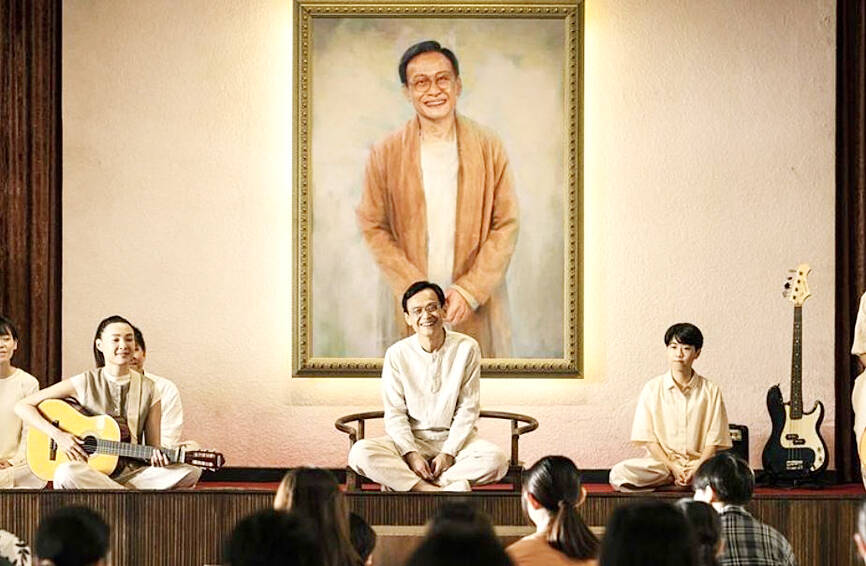The Criminal Investigation Bureau (CIB) on Sunday warned people about altering original works to create memes, as it is investigating whether recent incidents involving the unauthorized use of images of politicians and celebrities are in contravention of the Copyright Act (著作權法).
One case involves memes circulating on social media that are based on the recent hit Taiwanese film The Pig, The Snake and The Pigeon (周處除三害), which is described as a black comedy gangster action-thriller, bureau officials said.
One of the memes is based on a scene where the smiling Revered Master, played by Chen Yi-wen (陳以文), is facing a room full of his religious order’s followers. The two guardians sitting on the left and right were edited to have the faces of President Tsai Ing-wen (蔡英文) and president-elect William Lai (賴清德), the officials said.

Photo: screen grab from the Internet
“The movie plot from here on and its subsequent scenes are full of gratuitous violence, cruelty and indiscriminate killing ... so we received complaints from the public ... and we are investigating the case,” the officials said.
The person who edited the meme could be found guilty of “inciting others to commit an offense” under the Criminal Code, due to the violence depicted in the film, and could also have breached the Copyright Act by exceeding the limits of fair and reasonable use of an original work, the bureau said.
The intention behind most memes is to be funny or outrageous, and they involve parody or satire, the officials said.
However the actual photograph, image or video a meme is based on came from an original creation, and its author or creator is protected by law, they said.
If someone edits an image to include a prominent personality’s face, then they have contravened the Copyright Act and infringed on a person’s “portrait rights,” the officials said.
When someone alters an original creation, turning it into a meme and circulating it, they could be found to have remade or reproduced another’s original creation, in which case they should have obtained written permission or a copyright protection waiver from the creator, the officials said.
The bureau quoted a legal expert, who said that if the aim of altering a photograph or image is to make fun of the original creator, or to comment on current public issues, then it is deemed a parody in academic circles, but if a meme differs from the original creator’s intentions, it is deemed “transformative use” in legal terms.
Although a meme could be considered “reasonable use” under the Copyright Act, it could be considered to be in breach of the law when taking into account Article 65, which covers the “purposes and nature of the exploitation,” the “nature of the [original] work,” the “amount and substantiality of the portion exploited in relation to the work as a whole” and the “effect of the exploitation on the work’s current and potential market value,” the legal expert said.

Beijing could eventually see a full amphibious invasion of Taiwan as the only "prudent" way to bring about unification, the US Department of Defense said in a newly released annual report to Congress. The Pentagon's "Annual Report to Congress: Military and Security Developments Involving the People's Republic of China 2025," was in many ways similar to last year’s report but reorganized the analysis of the options China has to take over Taiwan. Generally, according to the report, Chinese leaders view the People's Liberation Army's (PLA) capabilities for a Taiwan campaign as improving, but they remain uncertain about its readiness to successfully seize

Taiwan is getting a day off on Christmas for the first time in 25 years. The change comes after opposition parties passed a law earlier this year to add or restore five public holidays, including Constitution Day, which falls on today, Dec. 25. The day marks the 1947 adoption of the constitution of the Republic of China, as the government in Taipei is formally known. Back then the Chinese Nationalist Party (KMT) governed China from Nanjing. When the KMT, now an opposition party in Taiwan, passed the legislation on holidays, it said that they would help “commemorate the history of national development.” That

Taiwan has overtaken South Korea this year in per capita income for the first time in 23 years, IMF data showed. Per capita income is a nation’s GDP divided by the total population, used to compare average wealth levels across countries. Taiwan also beat Japan this year on per capita income, after surpassing it for the first time last year, US magazine Newsweek reported yesterday. Across Asia, Taiwan ranked fourth for per capita income at US$37,827 this year due to sustained economic growth, the report said. In the top three spots were Singapore, Macau and Hong Kong, it said. South

HORROR STORIES: One victim recounted not realizing they had been stabbed and seeing people bleeding, while another recalled breaking down in tears after fleeing A man on Friday died after he tried to fight the knife-wielding suspect who went on a stabbing spree near two of Taipei’s busiest metro stations, Taipei Mayor Chiang Wan-an (蔣萬安) said. The 57-year-old man, identified by his family name, Yu (余), encountered the suspect at Exit M7 of Taipei Main Station and immediately tried to stop him, but was fatally wounded and later died, Chiang said, calling the incident “heartbreaking.” Yu’s family would receive at least NT$5 million (US$158,584) in compensation through the Taipei Rapid Transit Corp’s (TRTC) insurance coverage, he said after convening an emergency security response meeting yesterday morning. National